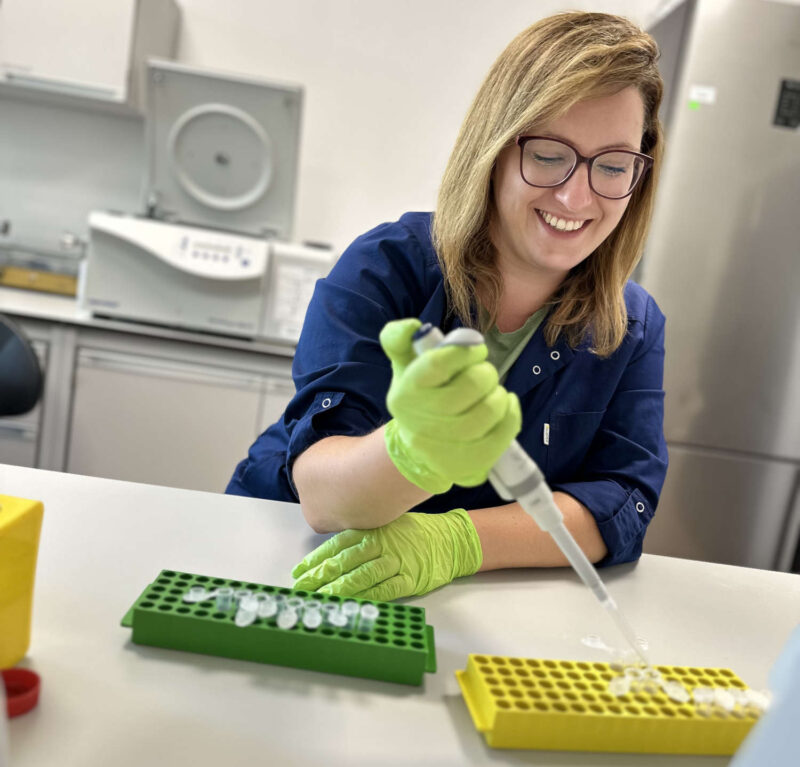
Dr. Anna Kononiuk from our Institute received a scholarship from the Minister of Science and Higher Education for outstanding young scientists. Her research focuses on the potential of deer meat as an alternative to commonly consumed meat species.
The ministerial scholarship program for outstanding young scientists can be awarded to a person conducting scientific activity who is a doctoral student or academic teacher and does not have a doctoral degree, or to a person with a doctoral degree that has been obtained within 7 years.
In the last edition, the Minister awarded scholarships to 228 outstanding young scientists representing 53 scientific and artistic disciplines. This time, 1,708 applications were submitted to the competition: https://www.gov.pl/web/nauka/ponad-44-mln-zl-dla-228-wybitnych-mlodych-naukowcow
The main scientific goal of Dr. Anna Kononiuk’s is to demonstrate the potential of deer meat as an alternative to commonly (conventionally) consumed meat species.
– Meat of animals classified as cervids (including red deer, roe deer, fallow deer) is a very valuable raw material compared to beef, pork and poultry popular on Polish tables. This is due to both nutritional and health considerations (incl. a higher content of iron and antioxidant compounds) as well as ecological considerations (incl. the fact that their breeding is less harmful to the environment compared to farm animals) – shows Dr. Anna Kononiuk from the Team of Biodiversity Protection IARFR PAS in Olsztyn.
She adds that in 2022, over 10,000 tons of game meat was obtained in Poland, of which approximately 56% was deer, 21% venison, and the remaining wild boar meat (data from the Central Statistical Office). – Game consumption in the country is only 0.08 kg per person per year, and approximately 95% of game purchased in Poland is exported, mainly to the German market (approx. 70%). This is related to the relatively high retail price of venison and the lack of consumer habits to eating it – points out the researcher.
Her current research focuses on comparing the potential of deer and beef for the formation of biologically active peptides (she heads the MINIATURA 7 project, financed by the National Science Center).
– The topic of this research results from previously observed differences in the concentration and antioxidant activity of peptides from raw-ripened fallow deer sausages and beef sausages. Compounds in fallow deer meat products showed much higher antioxidant activity than analogous variants of beef sausages. Additionally, the in silico research conducted confirms the higher potential of proteins from red deer to have anti-atherosclerotic effects, reduce glycemia and improve insulin release. These are very important functions that food consumption may have in terms of lifestyle diseases such as hypertension or type II diabetes – she points out.
In turn, in 2021-2022, the scientist managed a project under the Innovation Incubator 4.0 program, the aim of which was to develop two feed additives with unique technological and nutritional parameters, improving the condition of deer after the reproductive period and positively influencing the quality characteristics of the obtained meat, along with the entire their production process and animal feeding plan.
Moreover, in her research to date, she has also focused on limiting the use of nitrates in meat processing. This plays an important role in shaping the quality of meat products (including extending their shelf life), but – due to the high reactivity of nitrate – is also associated with the risk of the formation of undesirable compounds, mainly nitrosamines, which are considered carcinogenic compounds and may contribute to the formation of cancer of the large intestine, stomach and esophagus.
– The solution to this problem may be the use of freeze-dried acid whey, a by-product of cottage cheese production. It contains lactic acid bacteria, lactose and other nutrients necessary for the proper course of the fermentation process. My research has shown that the use of acid whey in organic, raw-ripened products allows the products to be durable during long-term refrigerated storage at a level similar to products with the addition of pickling salt. The process of freeze-drying acidic whey that I have proposed makes it possible to extend the shelf life and standardize the whey used, without losing its properties – says the researcher.
—
Dr. Anna Kononiuk received her PhD in 2020 from the University of Life Sciences in Lublin. Her work (written under the supervision of Prof. Małgorzata Karwowska) was distinguished by the Discipline Council and awarded in the competition of the Polish Society of Technology.